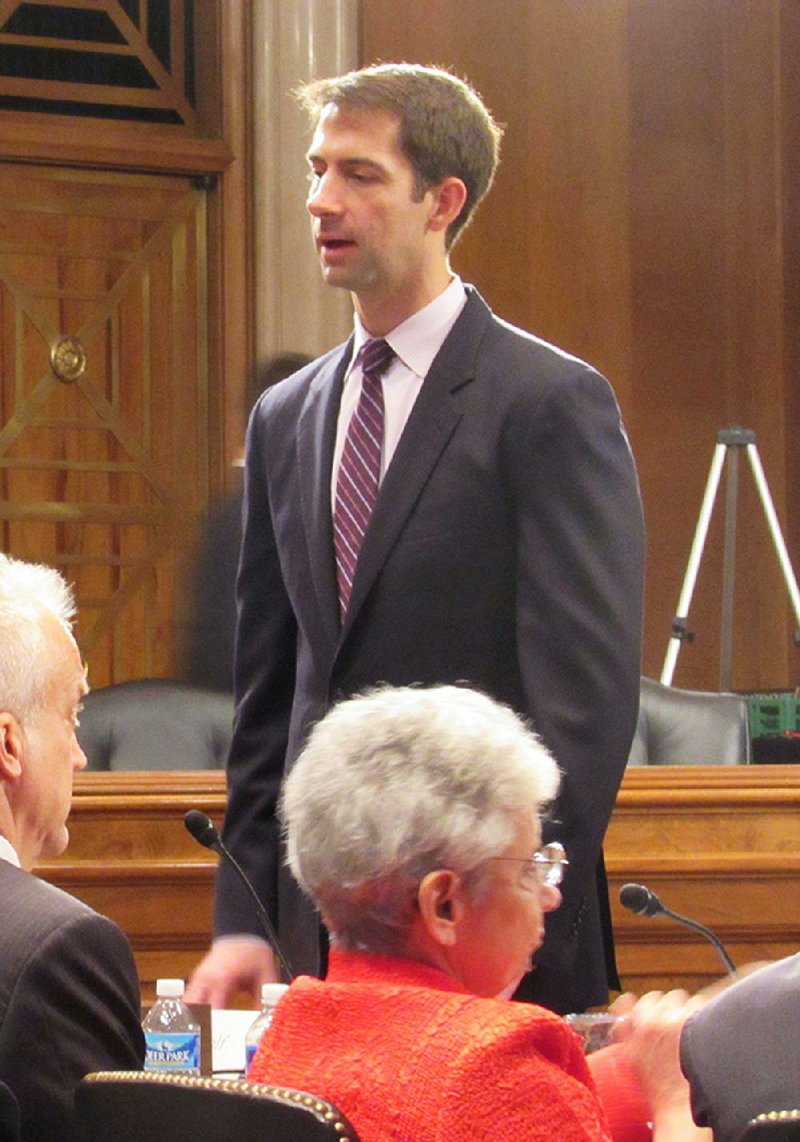WASHINGTON -- America's allies closely watch U.S. military spending, and cuts in funding put the United States at a disadvantage, Arkansas' U.S. Sen. Tom Cotton said Tuesday.
Cotton, a Republican, spoke at the American Enterprise Institute's Marilyn Ware Center for Security Studies about military readiness and funding.
"Shortsighted defense cuts don't put you in a better position because your enemies catch up with you, as they are increasingly catching up with us, and you spend more in the long-run to restart programs or rebuild capabilities then you would have spent if you had just kept them at a steady state of growth," he said.
Cotton, a former Army captain who served tours in Iraq and Afghanistan, has repeatedly called for increased military spending, saying that at a minimum Congress should follow former Secretary of Defense Robert Gates' 2012 recommendation of at least $611 billion next year.
President Barack Obama proposed spending $561 billion on defense next year, a $38 billion increase over the amount mandated by a cap known as sequestration that the president and Congress agreed to in 2013. The military would also receive $51 billion in war funding.
Under the caps and as the country has reduced its presence in Iraq and Afghanistan, defense and war spending has dropped nearly $200 billion from its 2008 peak of $760 billion.
Some Democrats in Congress have said that if the caps on military spending are lifted, Congress needs to lift the caps on domestic spending, as well.
Cotton disagreed.
"I don't believe every dollar of spending is equal. A dollar spent on a soldier, a dollar spent modernizing our submarine fleet or our bomber fleet is in my opinion much better spent than a dollar spent on pork barrel projects for some congressman or senator," he said.
He said the United States faces a variety of potential threats from Russia, China and Iran, as well as terrorism, and needs a force to deter them.
"We have to be prepared to confront those adversaries," Cotton said. "We can barely fight one war much less be able to deter a second war as well."
Cotton said Americans may not be cognizant of the nuances, but other countries pay close attention to small changes in the United States military.
"Oftentimes we don't appreciate that those kinds of seemingly remote signals are very critical around the world," he said. "It doesn't necessarily register much here, but it sends a terrible signal."
He used the 1990s' reductions in troops in the Marines and Army as an example.
The U.S. military had to ramp back up to fight in the Middle East, and that "had serious consequences for the way we conducted the wars in Iraq and Afghanistan," Cotton said. "This meant that those wars took longer, this meant that the wars were conducted in ways that didn't mean victory as quickly as we could obtain it and ... it took a great toll on the lives of the soldiers and Marines in particular that had to fight."
Reached by phone, Cato Institute Vice President for Defense and Foreign Policy Studies Christopher Preble said that at it's simplest level there are two ways to think about defense spending.
Cotton "thinks we're not doing enough in the world, and we think we're doing too much," Preble said. "If you agree with us, then it's not obvious that we need more money."
The Cato Institute is a think tank focused on free markets and limited government.
Preble said there can be legitimate debate over what military projects the government should fund -- like new ships or whether soldiers should be on the ground in a specific part of the world.
"But, what I'm troubled by is just a lack of specificity," Preble said. "Just generally that well, we're not spending as much as we were five years ago and therefore it's not nearly enough? Well, we were in the middle of two major wars five years ago, and both of those have effectively ended."
Cotton was also in the news earlier this week when he called for the president to respond to news that dozens of Secret Service agents had peeked at private information about U.S. Rep. Jason Chaffetz, R-Utah, who leads the House Oversight and Government Reform Committee.
The committee investigated problems within the Secret Service last spring. The Washington Post has reported that Secret Service Assistant Director Edward Lowery wrote in an email to a fellow director that "some information that he might find embarrassing needs to get out. Just to be fair."
Cotton said he is putting nominees for ambassadorial posts in the Bahamas, Norway and Sweden on hold until there are consequences for those involved. He also called for the Justice Department to launch a criminal investigation.
"The gravity of this scandal hasn't thus far been met with appropriate action from the highest levels of the executive branch," Cotton said on the Senate floor Monday. "Secretary of Homeland Security Jeh Johnson stated last week that he's 'confident U.S. Secret Service Director Joe Clancy will take appropriate action to hold accountable those who violated any laws or policies of this department.' This response is woefully inadequate on multiple counts," Cotton said.
Metro on 10/07/2015
